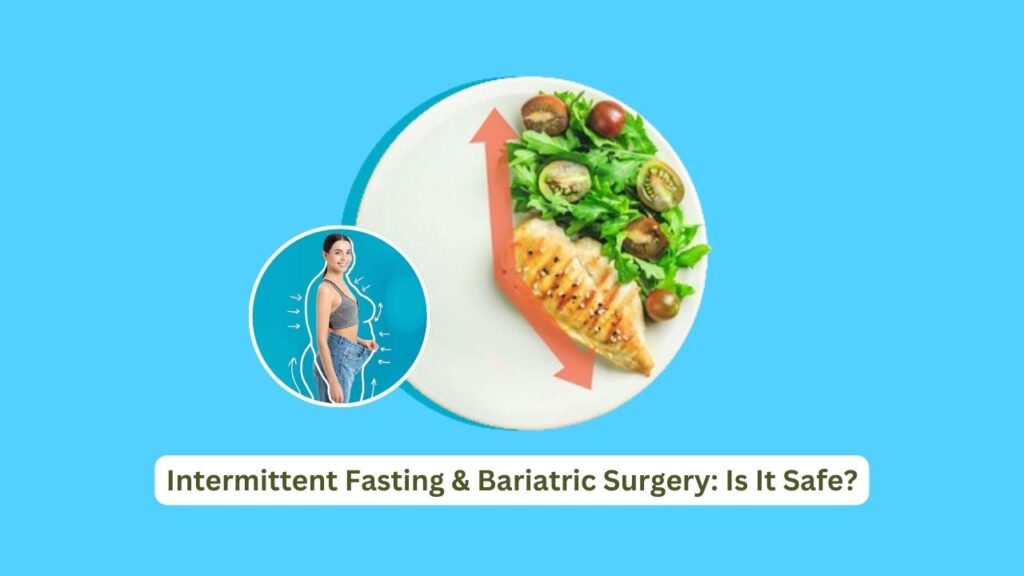
Shriya
Bariatric Dietician & Content Writer
Intermittent Fasting and Bariatric Surgery: Is It Safe?

For those who are obese, Bariatric surgery is an important step since it results in significant weight loss and health improvements. Patients must make long-lasting lifestyle modifications after surgery for their weight loss and general wellbeing. The practice of Intermittent Fasting (IF), is gaining popularity as a way for improving health and managing weight. Yet, there are concerns about the effectiveness and safety of Intermittent Fasting for people who have had bariatric surgery.
What is Bariatric Surgery?
Bariatric surgery is a type of surgery performed on people who are obese, typically with a body mass index (BMI) of 35 or higher. Its goal is to assist people lose weight by changing the digestive system to limit food intake and/or decrease nutrient absorption. There are various kinds of bariatric procedures, such as Laparoscopic Sleeve Gastrectomy, Gastric Bypass Surgery, Laparoscopic Mini Gastric Bypass and Intragastric Balloon. These operations function by rerouting the digestive tract, decreasing the size of the stomach, or doing both. For those who have tried and failed to lose weight with food and exercise alone, bariatric surgery is typically seen as a last resort.
What is Intermittent Fasting?
Intermittent fasting involves cycling between periods of eating and fasting. This can take various forms, such as the 16/8 method (fasting for 16 hours and eating during an 8-hour window), alternate-day fasting, or the 5:2 diet (eating normally for five days and restricting calories on two non-consecutive days).
Why is Intermittent Fasting generally not recommended after Bariatric Surgery?
Nutritional Needs: The body’s capacity to absorb nutrients may be reduced following bariatric surgery. For patients to make sure they get enough vitamins, minerals, and other vital nutrients, they must follow certain dietary guidelines. Further limiting food intake through intermittent fasting may result in deficiencies and other health issues.
Risk of Malnutrition: Due to the modified structure of their digestive systems, people who have had bariatric surgery already have reduced food intake; intermittent fasting may make them more at risk for malnutrition. Numerous health issues, such as decreased wound healing, lethargy, weaker immune system, and loss of muscle mass, can be caused by malnutrition.
Impact on Healing: It takes some time to recover from bariatric surgery so that the body can heal itself. By depriving the body of vital nutrients required for tissue repair and regeneration, intermittent fasting could delay this healing process.
Individual Variability: The way that bariatric surgery and intermittent fasting work for each patient can differ. While some people may be able to fast intermittently without any problems, others can face difficulties.
Overall, combining intermittent fasting with bariatric surgery is generally not recommended due to the potential risks and complications involved. Eating small, frequent meals is essential after bariatric surgery to prevent gaps in nutrition that can cause acid reflux and other digestive problems. Long periods of time without eating or fasting can raise the production of stomach acid, which can cause pain and even difficulties. Regular short meals minimize the danger of acid reflux, stop overindulgence in food, and preserve a regular supply of nutrients. This strategy guarantees a more seamless post-surgery experience and encourages long-term weight loss by supporting improved nutrient absorption, which is crucial for healing and general health.
Following the dietary guidelines given by the healthcare professional is particularly important for patients who have had bariatric surgery since these guidelines are customized to meet the unique needs and nutritional requirements of each patient. In order to promote the best possible healing, weight loss, and overall well-being, these recommendations usually focus on eating short, nutrient-dense meals throughout the day.





